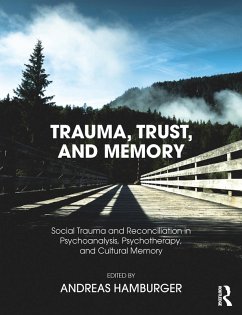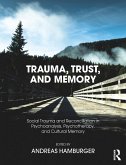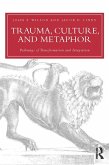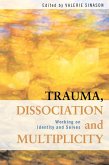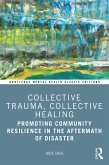Trauma, Trust, and Memory (eBook, PDF)
Social Trauma and Reconciliation in Psychoanalysis, Psychotherapy, and Cultural Memory


Alle Infos zum eBook verschenken

Trauma, Trust, and Memory (eBook, PDF)
Social Trauma and Reconciliation in Psychoanalysis, Psychotherapy, and Cultural Memory
- Format: PDF
- Merkliste
- Auf die Merkliste
- Bewerten Bewerten
- Teilen
- Produkt teilen
- Produkterinnerung
- Produkterinnerung

Hier können Sie sich einloggen

Bitte loggen Sie sich zunächst in Ihr Kundenkonto ein oder registrieren Sie sich bei bücher.de, um das eBook-Abo tolino select nutzen zu können.
Trauma is one of the most important topics discussed throughout the clinical, social and cultural field. Social traumatization, as we meet it in the aftermath of genocide, war and persecution, is targeted at whole groups and thus affects the individual's immediate holding environment, cutting it off from an important resilience factor; further on, social trauma is implemented in a societal context, thus involving the surrounding society in the traumatic process. Both conditions entail major consequences for the impact and prognosis of the resulting individual posttraumatic disorders as well as…mehr
- Geräte: PC
- ohne Kopierschutz
- eBook Hilfe
- Größe: 11.07MB
![Trauma, Trust, and Memory (eBook, ePUB) Trauma, Trust, and Memory (eBook, ePUB)]() Andreas HamburgerTrauma, Trust, and Memory (eBook, ePUB)36,95 €
Andreas HamburgerTrauma, Trust, and Memory (eBook, ePUB)36,95 €![Trauma, Abandonment and Privilege (eBook, PDF) Trauma, Abandonment and Privilege (eBook, PDF)]() Nick DuffellTrauma, Abandonment and Privilege (eBook, PDF)30,95 €
Nick DuffellTrauma, Abandonment and Privilege (eBook, PDF)30,95 €![Trauma, Culture, and Metaphor (eBook, PDF) Trauma, Culture, and Metaphor (eBook, PDF)]() John P. WilsonTrauma, Culture, and Metaphor (eBook, PDF)48,95 €
John P. WilsonTrauma, Culture, and Metaphor (eBook, PDF)48,95 €![Trauma, Dissociation and Multiplicity (eBook, PDF) Trauma, Dissociation and Multiplicity (eBook, PDF)]() Trauma, Dissociation and Multiplicity (eBook, PDF)31,95 €
Trauma, Dissociation and Multiplicity (eBook, PDF)31,95 €![Collective Trauma, Collective Healing (eBook, PDF) Collective Trauma, Collective Healing (eBook, PDF)]() Jack SaulCollective Trauma, Collective Healing (eBook, PDF)24,95 €
Jack SaulCollective Trauma, Collective Healing (eBook, PDF)24,95 €![Trauma, Shame, and Secret Making (eBook, PDF) Trauma, Shame, and Secret Making (eBook, PDF)]() Francis Joseph HarringtonTrauma, Shame, and Secret Making (eBook, PDF)33,95 €
Francis Joseph HarringtonTrauma, Shame, and Secret Making (eBook, PDF)33,95 €![Workplace Health (eBook, PDF) Workplace Health (eBook, PDF)]() Workplace Health (eBook, PDF)59,95 €
Workplace Health (eBook, PDF)59,95 €-
-
-
Dieser Download kann aus rechtlichen Gründen nur mit Rechnungsadresse in A, B, BG, CY, CZ, D, DK, EW, E, FIN, F, GR, HR, H, IRL, I, LT, L, LR, M, NL, PL, P, R, S, SLO, SK ausgeliefert werden.
- Produktdetails
- Verlag: Taylor & Francis
- Seitenzahl: 302
- Erscheinungstermin: 10. September 2020
- Englisch
- ISBN-13: 9781000114614
- Artikelnr.: 60122279
- Verlag: Taylor & Francis
- Seitenzahl: 302
- Erscheinungstermin: 10. September 2020
- Englisch
- ISBN-13: 9781000114614
- Artikelnr.: 60122279
theoretical considerations and initial observations on a Bulgarian sample -- Camellia Hancheva -- CHAPTER SEVEN -- A user-centred approach to helping women survivors of war rape in Bosnia and Herzegovina -- Amra DeliC and Esmina AvdibegoviC -- CHAPTER EIGHT -- Who should be held responsible for war crimes? -- Sara RistiC -- CHAPTER NINE -- Genocide can be mourned: the wager of psychoanalysis in Bosnia and Herzegovina -- Damir ArsenijeviC and Emin EminagiC -- PART III -- CLINICAL PERSPECTIVES ON SOCIAL TRAUMA -- Introduction to Part III -- CHAPTER TEN -- In the shadow of the Obersalzberg: the daughter of an SS officer -- Horst Kdohele -- CHAPTER ELEVEN -- Psychopathology and resident status
comparing asylum seekers, refugees, irregular migrants, labour migrants, and residents -- Martina Heeren, Lutz Wittmann, Ulrike Ehlert, Ulrioh Sohnyder, Thomas Maier, and Julia Mtiller -- CHAPTER TWELVE Trauma and attachment -- Anna BuChheim -- CHAPTER THIRTEEN -- Attachment in students from cities of the former Socialist Federal Republic of Yugoslavia -- Tatjana StefanoviC StanojeviC and Jasmina NedeljkoviC -- CHAPTER FOURTEEN -- Attachment in postwar societies of the former Yugoslavia -- Vladimir Hedrih, Marija PejiciC, and Ivana PedoviC -- CHAPTER FIFTEEN -- Attachment and mentalization in war veterans with and without post-traumatic stress disorder -- Vedrana BerlekoviC and Aleksandar DimitrijeviC -- CHAPTER SIXTEEN -- Psychic trauma and drug addiction -- Nikola Atanassov and Svetoslav Savov -- CHAPTER SEVENTEEN -- Scenic re-enactment in Holocaust testimonies: scenic-narrative microanalysis and grounded theory -- PasCal Heberlein and Andreas Hamburger -- CHAPTER EIGHTEEN -- Assessing traumatic re-enactment
now moments in survivor interviews -- Jasmin Bleimling -- PART IV -- DEVELOPMENTAL PERSPECTIVES -- Introduction to Part IV -- CHAPTER NINETEEN -- Marked for life
psychotherapy in the case of a severely traumatised child -- Annette StreeCk-FisCher -- CHAPTER TWENTY -- Can mentalization disrupt the circle of violence in adolescents with early maltreatment? -- Svenja Taubner and Paul Sohroder -- CHAPTER TWENTY-ONE -- Mentalization of trauma in juvenile offenders -- Sonja ProtiC -- CHAPTER TWENTY-TWO -- Hostility and empathy in adolescence as predictors of aggressive, prosocial, and avoidant behaviour -- Svetlina Koleva -- PART V -- TRAINING AND RESEARCH IN SOCIAL TRAUMA -- Introduction to Part V -- CHAPTER TWENTY-THREE -- What do psychology students learn about social trauma in study programmes at trauma, trust, and memory network universities? -- MaSa BoioviC, Chrysanthi Papadopoulou, Margarita Papazova, DuSka Sain, Jusuf HafizoviC, -- Aleksandra StojilkoviC, Gloria Velinova, Jonas Diekhans, SiniSa LakiC, Tomi Tzolov, and Sonja ProtiC -- CHAPTER TWENTY-FOUR -- International master's study course in social trauma -- Camellia HanCheva, Carmen SCher, and Andreas Hamburger -- CHAPTER TWENTY-FIVE -- An academic network on social trauma in southeast Europe -- Andreas Hamburger and Carmen SCher -- INDEX
theoretical considerations and initial observations on a Bulgarian sample -- Camellia Hancheva -- CHAPTER SEVEN -- A user-centred approach to helping women survivors of war rape in Bosnia and Herzegovina -- Amra DeliC and Esmina AvdibegoviC -- CHAPTER EIGHT -- Who should be held responsible for war crimes? -- Sara RistiC -- CHAPTER NINE -- Genocide can be mourned: the wager of psychoanalysis in Bosnia and Herzegovina -- Damir ArsenijeviC and Emin EminagiC -- PART III -- CLINICAL PERSPECTIVES ON SOCIAL TRAUMA -- Introduction to Part III -- CHAPTER TEN -- In the shadow of the Obersalzberg: the daughter of an SS officer -- Horst Kdohele -- CHAPTER ELEVEN -- Psychopathology and resident status
comparing asylum seekers, refugees, irregular migrants, labour migrants, and residents -- Martina Heeren, Lutz Wittmann, Ulrike Ehlert, Ulrioh Sohnyder, Thomas Maier, and Julia Mtiller -- CHAPTER TWELVE Trauma and attachment -- Anna BuChheim -- CHAPTER THIRTEEN -- Attachment in students from cities of the former Socialist Federal Republic of Yugoslavia -- Tatjana StefanoviC StanojeviC and Jasmina NedeljkoviC -- CHAPTER FOURTEEN -- Attachment in postwar societies of the former Yugoslavia -- Vladimir Hedrih, Marija PejiciC, and Ivana PedoviC -- CHAPTER FIFTEEN -- Attachment and mentalization in war veterans with and without post-traumatic stress disorder -- Vedrana BerlekoviC and Aleksandar DimitrijeviC -- CHAPTER SIXTEEN -- Psychic trauma and drug addiction -- Nikola Atanassov and Svetoslav Savov -- CHAPTER SEVENTEEN -- Scenic re-enactment in Holocaust testimonies: scenic-narrative microanalysis and grounded theory -- PasCal Heberlein and Andreas Hamburger -- CHAPTER EIGHTEEN -- Assessing traumatic re-enactment
now moments in survivor interviews -- Jasmin Bleimling -- PART IV -- DEVELOPMENTAL PERSPECTIVES -- Introduction to Part IV -- CHAPTER NINETEEN -- Marked for life
psychotherapy in the case of a severely traumatised child -- Annette StreeCk-FisCher -- CHAPTER TWENTY -- Can mentalization disrupt the circle of violence in adolescents with early maltreatment? -- Svenja Taubner and Paul Sohroder -- CHAPTER TWENTY-ONE -- Mentalization of trauma in juvenile offenders -- Sonja ProtiC -- CHAPTER TWENTY-TWO -- Hostility and empathy in adolescence as predictors of aggressive, prosocial, and avoidant behaviour -- Svetlina Koleva -- PART V -- TRAINING AND RESEARCH IN SOCIAL TRAUMA -- Introduction to Part V -- CHAPTER TWENTY-THREE -- What do psychology students learn about social trauma in study programmes at trauma, trust, and memory network universities? -- MaSa BoioviC, Chrysanthi Papadopoulou, Margarita Papazova, DuSka Sain, Jusuf HafizoviC, -- Aleksandra StojilkoviC, Gloria Velinova, Jonas Diekhans, SiniSa LakiC, Tomi Tzolov, and Sonja ProtiC -- CHAPTER TWENTY-FOUR -- International master's study course in social trauma -- Camellia HanCheva, Carmen SCher, and Andreas Hamburger -- CHAPTER TWENTY-FIVE -- An academic network on social trauma in southeast Europe -- Andreas Hamburger and Carmen SCher -- INDEX
